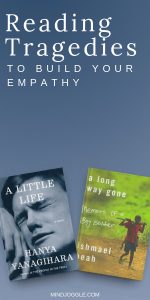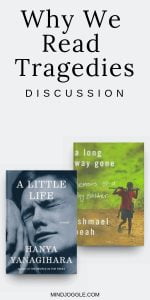Discussion: The Discomfort of Enjoying Books Inspired by Real-Life Tragedies
This post may include affiliate links. That means if you click and make a purchase, I may earn a small commission. Please see Disclosures for more information.
Some of my favorite books are inspired by tragic, horrific events.
I actually feel pretty uncomfortable with that statement–as though I’m enjoying another person’s suffering and grief. But it’s true. These are some of the books that affect me most deeply and that offer the immersive reading experience I’m constantly chasing.
I’ve been thinking about this lately after writing two posts about books that have brought out some discomfort in readers.
The first, Bel Canto, makes some readers uncomfortable for taking its inspiration from a real-life hostage situation in Peru.
The second, A Little Life, is not inspired by any single event, but its graphic detail and unflinching look at child abuse creates a different kind of discomfort.
In both cases, though the situations and people in the books are fictional, readers look in on horrific and tragic events that real people endure. Real people were held hostage in Peru, and real people died. Children endure unimaginable abuses every day, and adults who survived abuse struggle–and sometimes fail–to reconcile what happened to them as children.
As a reader, I start to wonder who I am and what my reasons are for making elements of another person’s tragedy a part of my entertainment.
What determines whether a story is gratuitous in its depictions of such horrors, and what makes our consumption of a story vulgar, rather than instructive or empathetic?
The Value of Story and Why We Read
Art and reading are not solely “entertainment,” of course–this classification feels too simplistic. People both create and consume art for myriad reasons–empathy, understanding, expression, and learning among them.
Some of the great works of literature have been inspired by true events–slavery, the Holocaust, the Great Depression, wars, 9/11, school shootings, natural disasters. Fictionalizing those events allows readers a small peek into what real people may have endured, without invading the very personal memories, traumas, and losses of those real people.
In some cases, we may have very little access to the real people who lived through tragic events. Time passes and the events move into the realm of historical fiction. Some survivors simply aren’t willing to share their stories–and that’s okay.
Sometimes, readers may be seeking reassurance and an assuaging of fears. Yes, these are real situations that people lived through–but often the point is that they lived.
And if they lived, then we, the reader, could also live–should we find ourselves there as well.
As trite as it may sound, there are other things that people seek in stories: strength of the human spirit, triumph of good over evil, survival in the face of adversity.
I think this is one reason that I’ve been fascinated in recent years by fictional stories of shootings: Fierce Kingdom, 19 Minutes, and The Hour I First Believed (okay, the first part anyway) all had me riveted and breathless, but also thinking about what I would do if I were caught in the crossfire.
Exploitation or Bearing Witness?
One of the reasons A Little Life rocked the world of so many readers is that it wasn’t a story of survival or redemption. (spoilers ahead) Yes, Jude survived his childhood, but ultimately the damage done to him was insurmountable.
Yanagihara’s point in doing this wasn’t to torture a character (or the reader), but to explore a person who has experienced so much trauma that there is no repairing or coming back from it.
This is a realistic portrayal of life for many people, but it’s not the reassuring story of repair and triumph that many readers seek.
And it’s at this point that we start to wonder: is reading this, and being riveted by this story, exploitative? Am I, or is someone else, somehow just profiting from someone else’s misery? Is this just “misery porn?”
Hanya Yanagihara addressed this question of “misery porn” in this video interview. To paraphrase, she said that we, as readers, have a responsibility to bear witness to suffering, when the life of a character is composed of suffering. It is not necessarily the responsibility of the author to determine how much suffering is too much suffering, for either the reader or the character.
Every person, every reader, must decide for themselves what is too much to bear and which traumas they are able to sit with. I’ll be honest–there are horrific news stories that I have to turn away from, and most of them are related to exactly the things that Jude endures in A Little Life.
At times I feel guilty about doing this, knowing that the victims couldn’t turn away but I have the luxury of rejecting mere words about their suffering.
I think what literature offers me, that news doesn’t, is the moments beyond the horror: the lasting effects, the struggles, the survival, and–sometimes–the redemption.
While Yanagihara doesn’t offer that reassurance of survival, what she does offer is an entry point for understanding. This is something literature provides that real life and our limited vantage points and observation of it often don’t. News stories generally offer only horror and no humanity.
Readers who did not like A Little Life sometimes criticize how unbelievable it is that Jude could endure so much, how one person could be so unlucky. On the flip side, however, one might also point out Jude’s relative privilege: his good looks, his elite education, his successful career, his devoted friends and adoptive family (that adopted him as an adult, no less!).
To any outsider, Jude’s life is full of riches; he has every reason to be happy. Jude is alone with his suffering, sharing it only with us, the readers. Even his closest friends are largely unaware of most of it.
Consider the reaction, if Jude were a real person and we knew him only from the objective facts of his life, as reported on the news. I can see the vitriolic Facebook comments now: what could a person with so many riches possibly be unhappy about? (Never read the comments.)
But as a reader who is privy to his moments of deepest suffering, I need to decide how to approach the responsibility of sharing them with the sufferer. If you’re skeptical of how this can apply to fiction, bear with me.
Related: 11 Devastating Books Like A Little Life
Readers’ Responsibilities in the Face of Difficult Content
I’ll start with a non-fiction example. Late last year, I read A Long Way Gone: Memoirs of a Boy Soldier by Ishmael Beah. In this book, Beah details how war came to his home in Sierra Leone when he was a child.
As rebels rampaged through the country, killing everyone in their path, Beah was first on the run and then pressed into military service, drugged, and trained as a killer.
A Long Way Gone was an incredibly difficult book to read. The horrors pile up. At times, I struggled to continue–but I felt an obligation to finish.
These horrors were personal to Beah; they happened to him, and he was willing to share his experience with the world. The very least I can do, as a reader, is read his story, enter his world, and try to understand his suffering, even just a little bit.
I approach fiction in the same way. I don’t necessarily expect someone who has endured the horrors that Jude did in A Little Life to share their personal story, but these things happen to people. Because the suffering seems fantastical or unrealistic to outsiders doesn’t mean that it’s not real.
And the very least I can do is enter a world where the suffering is happening, improve my understanding of it, and empathize with the character–a proxy for the people who are enduring similar things in real life.
I don’t choose to enter those worlds as a voyeur or to marvel at the pain that people endure. And I have to believe that Yanagihara and other authors like her don’t offer them up for those reasons either.
Yes, literature and publishing are commercial ventures. People and companies make money from the publishing of extremely sensitive content.
But it’s that sensitive content that contributes to the building of sensitive, empathetic humans–and that feels more important than ever in a world that is increasingly numbed to the sufferings of others. Because sometimes the bare minimum leads to more: donations, volunteerism, activism–all things that are also sorely needed in the face of suffering.
As long as I, and others, can continue to approach these topics with intention, I will continue to read, contemplate, and share difficult content.
What Do You Think?
I know this was long for a “discussion” post, but I’d love to know what you think. How do you approach the reading of tragic, horrific stories–fiction or non-fiction? At what point does the writing of such stories cross the line to gratuitous or exploitative?



